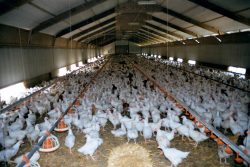 Abraham Lincoln
If given the truth, the people can be depended upon to meet any national crisis...
Abraham Lincoln
If given the truth, the people can be depended upon to meet any national crisis...
 Guildford news...
for Guildford people, brought to you by Guildford reporters - Guildford's own news service
Guildford news...
for Guildford people, brought to you by Guildford reporters - Guildford's own news service
Letter: Do British People Really Want ‘Chlorine-washed Chicken’?
Published on: 15 May, 2020
Updated on: 16 May, 2020
Green Party Member
Our daily vocabularies are forever being supplemented by new phrases drawn from current societal and cultural issues. Terms such as “flattening the curve” and “social distancing”, meaningless just six months ago, are now in common use and generally understood by most people. Many of us will likely remember an older and more bizarre example of these new phrases, “chlorine-washed chicken”.
This refers to chicken carcasses which must be washed in strong antibacterial baths to ensure food safety due to the poor welfare conditions birds are kept in. It first gained traction several years ago during trade negotiations with the US, where 99% of all livestock is raised in factory farms under conditions which would be illegal in the UK.
But the term revived last year during Brexit discussions, with campaigners and farmers fearing that a UK scrambling for any trade deal it could find would allow the import of cheap, low-quality meat from the US.
Despite repeated assurances from the Prime Minister, on Wednesday a new clause in the Agriculture Bill aimed at protecting consumers from these imports (and farmers from unfair competition) was voted down in parliament.
The key section of the amendment reads: “Any agricultural or food product imported into the UK under the agreement will have been produced or processed according to standards which are equivalent to, or which exceed, the relevant domestic standards and regulations in relation to animal health and welfare, plant health, and environmental protection.
Twenty Conservative MPs, including East Surrey’s new representative, Claire Coutinho, voted against the government on this clause. Unfortunately, Guildford’s Angela Richardson MP was not among them.
Factory farming is making inroads in the UK, including in our region, but British people have always had a reputation for preferring high welfare standards for our livestock, as well as supporting domestic farmers as much as their wallets allow.
Are we to believe that our MP thinks her constituents would be happy eating animals raised in such poor conditions they must be “chlorine-washed” before they are edible, or chewing on meat pumped full of growth hormones.
Do Guildfordians not care about local farmers, or minimising the impacts of food production on the environment and our countryside? A quick poll of local residents I know suggests otherwise.
Responses to Letter: Do British People Really Want ‘Chlorine-washed Chicken’?
Leave a Comment Cancel replyPlease see our comments policy. All comments are moderated and may take time to appear.

"Found any?" - "Nope, it all looks green to me!" (See Opinion: The Future is Congested, the Future is Grey)
www.abbotshospital.org/news/">





Recent Articles
- Latest Evidence in Sara Sharif Trial
- Ash’s New Road Bridge Is Named – and November 23rd Is Opening Day
- Class A in Underwear Leads to Jail Sentence
- Historical Almshouse Charity Celebrates Guildford in Bloom Victory
- Notice: Shalford Renewable Showcase – November 16
- Firework Fiesta: Guildford Lions Club Announces Extra Attractions
- Come and Meet the Flower Fairies at Watts Gallery
- Updated: Royal Mail Public Counter in Woodbridge Meadows to Close, Says Staff Member
- Letter: New Developments Should Benefit Local People
- Open Letter to Jeremy Hunt, MP: Ash’s Healthcare Concerns


Recent Comments
- Paul Spooner on Ash’s New Road Bridge Is Named – and November 23rd Is Opening Day
- Harry Eve on Opinion: The Future is Congested, the Future is Grey
- Nigel Keane on Letter: New Developments Should Benefit Local People
- Nathan Cassidy on Updated: Royal Mail Public Counter in Woodbridge Meadows to Close, Says Staff Member
- T Saunders on Opinion: The Future is Congested, the Future is Grey
- Jim Allen on Updated: Royal Mail Public Counter in Woodbridge Meadows to Close, Says Staff Member
Search in Site
Media Gallery
Dragon Interview: Local Artist Leaves Her Mark At One of England’s Most Historic Buildings
January 21, 2023 / No Comment / Read MoreDragon Interview: Lib Dem Planning Chair: ‘Current Policy Doesn’t Work for Local People’
January 19, 2023 / No Comment / Read MoreA3 Tunnel in Guildford ‘Necessary’ for New Homes, Says Guildford’s MP
January 10, 2023 / No Comment / Read More‘Madness’ for London Road Scheme to Go Ahead Against ‘Huge Opposition’, Says SCC Leader
January 6, 2023 / No Comment / Read MoreCouncillor’s Son Starts Campaign for More Consultation on North Street Plan
December 30, 2022 / No Comment / Read MoreCounty Council Climbs Down Over London Road Works – Further ‘Engagement’ Period Announced
December 14, 2022 / No Comment / Read MoreDragon Interview: GBC Reaction to the Government’s Expected Decision to Relax Housing Targets
December 7, 2022 / No Comment / Read MoreHow Can Our Town Centre Businesses Recover? Watch the Shop Front Debate
May 18, 2020 / No Comment / Read More








Steve Perkins
May 15, 2020 at 11:57 pm
I have a simple question for Angela Richardson, would you ever vote against the Tory whip? Or have the good people of Guildford selected someone with no individual opinions?
Marilyn Strange
May 16, 2020 at 6:16 am
I find it unacceptable that we are allowing these poor standards into our country, Costco American brand name Kirkland) have chlorine-washed chicken from USA.
Why didn’t our MP vote against this poor practice? Our farming standards are highly regarded as the best animal welfare practices in the world. This is at great cost to farmers and now will be undermined by foreign imports. Please buy British meat.
Steph Bleach
May 16, 2020 at 8:00 am
Angela Richardson, putting profit before people again.
John Perkins
May 16, 2020 at 2:57 pm
British people are as capable as any other of deciding whether or not to purchase “chlorine-washed chicken” just as they are able to decide if they want to swim in a chlorine-filled pool.
Chlorine-washed chicken was normal in this country until 1998 and, after the EU introduced its ban, some people became ill because they continued to wash the unchlorinated carcass under the tap before cooking it, thus splashing harmful bacteria about.
Anybody who watched “Hugh’s Chicken Run” or “Jamie’s Fowl Dinners” will be aware of how appalling intensive battery farming already is in this country. They will also know that many consumers change their buying habits when they are informed about what happens in these factories – because they do care.
The UK is still bound by EU rules during the transition period and this amendment could well have fallen foul of them by excluding pork from those EU states which are thought to still use sow stalls (illegally, seven years after the end of the 11-year phase-out period).
Peta Malthouse
May 17, 2020 at 9:33 am
The point is we will not know what chicken is chlorinated or not. Fast-food chains and products made from chicken will source their produce from wherever it is cheapest and it is clear from this government response that we could not even rely on them to ensure it is labelling, as that too would be expected to be part of the US Trade Agreement.
Not only are there good welfare reasons for rejecting chlorinated chicken there are health issues as well. It is as effective against salmonella but not, it is claimed, against campylobacter.
Perhaps we could call on our MP to explain her thoughts?
John Perkins
May 17, 2020 at 3:18 pm
It’s true people will not be able to know what goes into prepared food, but it’s also true now. Cheap supermarket chicken, cheap curries, cheap fried chicken all come from battery farmed birds. They’ve all been reared in dreadful conditions with no regard for welfare. What difference does it make if their carcasses are chlorinated or not?
Chicken produced under the current rules is infected with campylobacter. If it’s treated and cooked properly then it’s safe.
Sam Peters
May 19, 2020 at 10:33 am
Exactly. That’s why we have legislation setting minimum standards for animal welfare, food safety and so on. Consumers might not be able to tell when they’re eating even-lower-quality imported food from the label, but they’ll certainly be able to tell when the UK starts experiencing similar levels of food poisoning to consumers in the US, currently 11x higher. And that’s before we even mention the dramatically higher levels of all sorts of other diseases and illnesses caused by poor food quality that the US exhibits.
All that of course also ignores the impact on farmers, who will be simply unable to compete with highly-subsidised, cheaply-produced rubbish from the US.
It appears your argument is that “Some of our food is already bad so why not make it worse?” Shouldn’t it instead be “Some of our food is already bad so let’s make it better and not allow it to get worse”?
John Perkins
May 19, 2020 at 4:52 pm
My point is that intensively reared chicken, chlorinated or not, and any product made from it is easily identifiable – it is cheap.
Pay more, protect chickens, save farmers.
Sam Peters
May 20, 2020 at 11:33 am
But for millions of people living in poverty and food insecurity, there simply isn’t the option to just ‘pay more’, whether they’re aware that food is low-quality thanks to the label, the price or any other reason. The only way to actually protect consumers, farmers and animals is to legislate to uphold minimum standards for all the above.
In particular, the above completely ignores that farmers simply won’t be able to compete with heavily-subsidised, low-quality imported food. Even if we lowered our domestic standards to those of the US, which I would hope most people would be against, they still wouldn’t be able to produce more cheaply than monopolised US farmers propped up by billions in tax dollars.
As mentioned already, poorer food quality leads to worse health outcomes. Food poisoning already costs the NHS around £115million a year. Is it really a good idea to lower our food standards to that of a country which experiences food poisoning at rates 11x higher than we do? This is for food poisoning alone, of course, not including any other diseases or illnesses related to poor quality food or the general impacts on individual and societal health.
Put simply, we should want – and the vast majority do want – to strive for better on all these issues, not race to the bottom.
Jules Cranwell
May 18, 2020 at 7:56 am
There’s a simple solution to avoid chlorine washed chicken: don’t eat chicken. There are plenty of plant based alternatives.
I’ve not eaten any kind of meat for 53 years, and it had had only beneficial effects.
John Perkins
May 21, 2020 at 10:15 am
The subject of the original letter was about chlorine-washed chicken, yet it’s an irrational fear because swimming pools contain chlorine and so do plastic-packed salad and vegetables. Nobody seems troubled by them.
Later, the subject morphed into one about animal welfare in the US, but that’s a spurious argument as the UK imports frozen chicken from Brazil where standards are lower still. In the two years from April 2017 at least a million chickens infected with Salmonella were imported from there: http://www.theguardian.com/environment/2019/jul/03/brazil-one-million-salmonella-infected-chickens-uk.
Now the issue has changed again into one of those unable to pay more and once again it’s spurious because, if everybody adhered to high standards, there would not be any cheap chicken for them to buy.
Despite its high standards, the UK still suffers from problems with contaminated chicken. In 2000, some meat dealers were convicted of selling condemned chicken to retailers. It’s too much to believe that case ended the practice.
Another consideration is the people who work in intensive farming. Those on minimum wage in the processing factories say they don’t eat chicken any more because the conditions are so awful.
It’s a rotten business, but it’s unreasonable to single out the US for criticism.
Peta Malthouse
May 21, 2020 at 3:43 pm
Thank you for this and your concerns are real and well reported. The issue, however, is one of regulation. Clearly Brazil fell below the necessary standard in part to export to the EU but the US has a totally different form of regulation which it is keen for us to accept.
As a result, we would lose trading status with the EU and our own high welfare standards would be under attack. Why? Because there are no equivalent welfare standards in the US. It is a country that still allows pigs to be fed Ractopamine, banned in the EU and 160 countries overall, and hormones in beef production.
The role of chlorine washing is not abhorrent in itself and it aims to address salmonella but, as I said in an earlier letter on this subject, it does not get rid of Campylobacter which is a distressing and, if people have other conditions, can be fatal. The infection rate in the US is about four times greater than in the UK.
John Perkins
May 22, 2020 at 12:50 pm
Aye, there’s the rub. It’s really about the EU.
Exports of chicken from the UK to the EU are less than 1/30th of the value of fish taken under the Common Fishing Policy.
Loss of trading status could only come about if there were no way of preventing imported US chicken being re-exported to the EU.
As stated earlier, chicken produced under EU rules is also infected with campylobacter.
Martin Cull
May 22, 2020 at 8:40 pm
If my experience is anything to go by when contacting our MP good luck with that. I have been waiting for a reply since before the lockdown. January 8 to be precise.